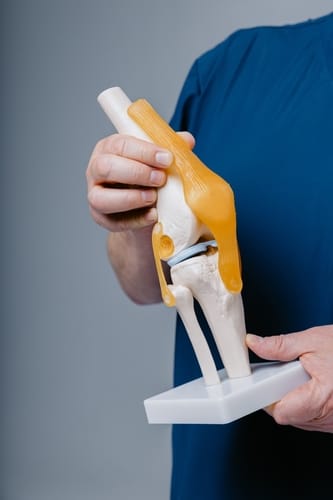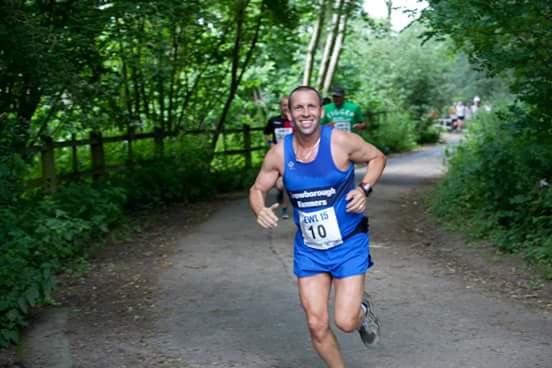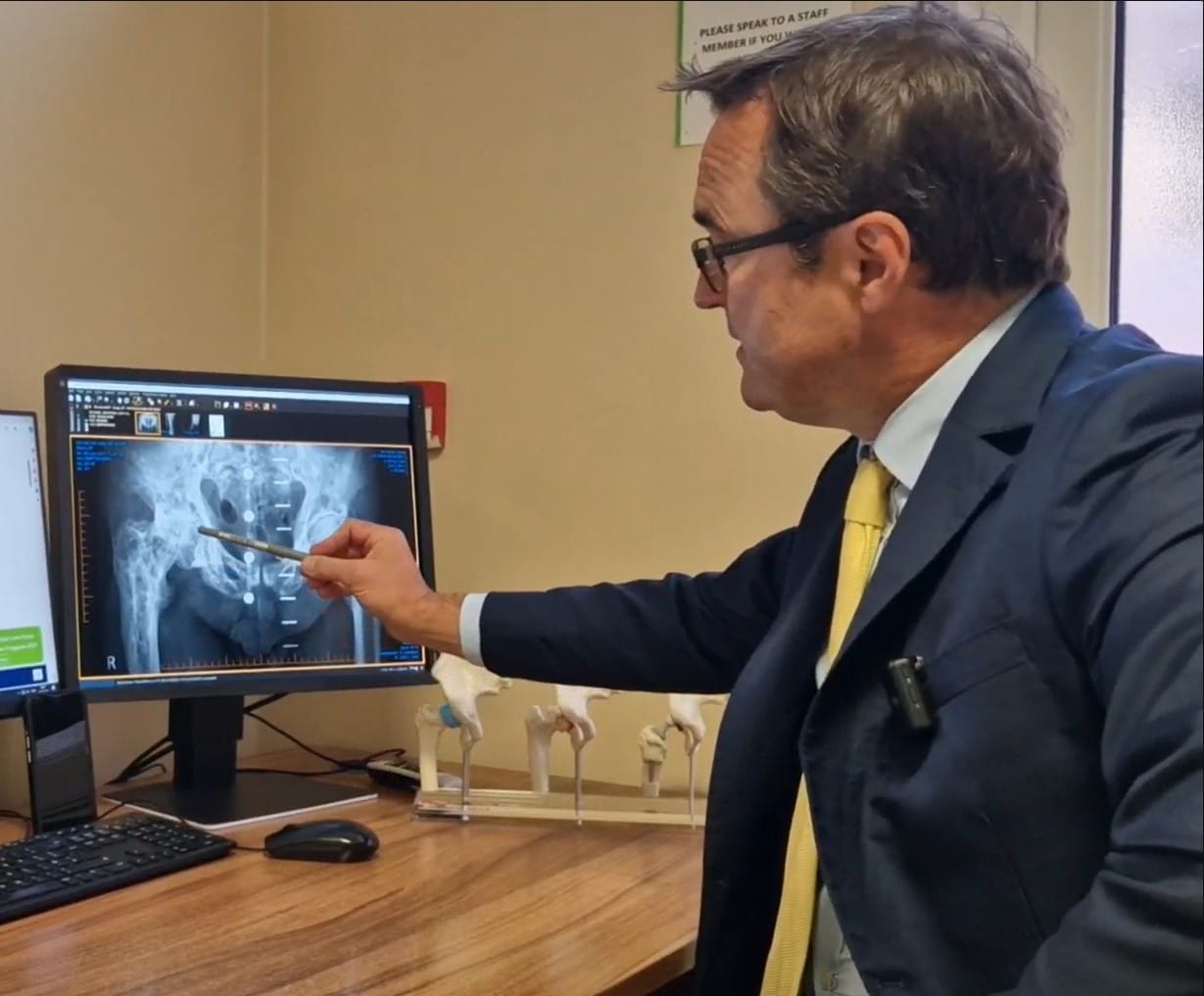Knee replacement surgery is a routine operation, most commonly used to treat pain and damage to the knee joint caused by arthritis.
Over 70,000 knee replacements are carried out in England and Wales each year, with most patients over 65 years old.
Knee replacement procedures remove and replace a damaged knee joint with an artificial one. If looked after properly, artificial knee joints can last over 20 years.
Understanding what knee replacement surgery involves is important if you or a loved one is going to undergo the procedure. Knowing the benefits it can bring and how to look after your new joint is essential for enhanced recovery and for increasing the longevity of your artificial joint.
This blog post is going to examine knee replacement surgery and the benefits it can bring as well as answer some frequently asked questions about the procedure. Discover all you need to know about knee replacements and what they involve with The Horder Centre.
Understanding knee replacement
 You might think your knee is just the patella (or knee cap), but it’s a lot more than that. Your knee is two long bones held together by muscles, tendons and ligaments. Tendons are connective tissue that joins the muscles to the bone and ligaments connect bone to bone. Ligaments can also help keep your knee stable. At the end of each bone is a layer of cartilage which absorbs shock and keeps your knee protected.
You might think your knee is just the patella (or knee cap), but it’s a lot more than that. Your knee is two long bones held together by muscles, tendons and ligaments. Tendons are connective tissue that joins the muscles to the bone and ligaments connect bone to bone. Ligaments can also help keep your knee stable. At the end of each bone is a layer of cartilage which absorbs shock and keeps your knee protected.
Knee replacements are a last resort measure and will only be done if other treatments, such as medication and physiotherapy, haven’t provided you with any relief.
Types of knee replacement
There are two types of knee replacement — total and partial.
In a partial knee replacement, the anterior and posterior cruciate ligaments are not removed. In a total knee replacement, they are. Partial knee replacements are less invasive and can have a faster recovery time. However, if your knee worsens over time, you may need further surgery. A total knee replacement can reduce your risk of needing further surgery.
Knee replacement procedure
A knee replacement is mostly carried out under general anaesthetic, which means you will be asleep throughout the surgery. However, you may have a spinal or epidural anaesthetic. This will numb you from the waist down, meaning you will be awake during the procedure. You can discuss the right type of anaesthetic for you with the anaesthetist. The entire process usually takes between one hour and 90 minutes.
Once the anaesthetic has taken effect, the surgeon will make an incision on the front of your knee to expose your kneecap. The kneecap is gently moved to the side so the knee joint can be accessed. Damage to the thigh bone and shin bone is removed and the ends of the bones are measured and shaped so the prosthetic joint fits it perfectly.
A dummy prosthesis is used first so that any adjustments to the bone or artificial joint can be made. Once the right size and placement are decided, the real prosthesis is fitted. The end of your femur is replaced with a curved piece of metal and the end of your tibia is replaced with a flat metal plate. These are fixed into place and a plastic spacer is placed between them. This spacer works like cartilage and prevents friction between your joints.
Finally, the incision is closed up with stitches and you are taken into the recovery room.
Benefits of knee replacement
There are lots of benefits to having a knee replacement, the main one being a much-improved quality of life. You will experience a big reduction in pain and an increase in your mobility, meaning you will be able to enjoy lots of activities you had to stop previously.
One of our patients who had a knee replacement surgery described ‘walking normally with no pain,’ just 10 weeks later, which shows just how much of a difference the surgery can make.
Another happy patient let us know that they were ‘very pleased’ with every aspect of their knee replacement surgery. They went on to say, ‘The whole process was fast and very professional. All care was excellent.’
These testimonials from our knee replacement surgery patients highlight the level of care we provide at The Horder Centre, as well as what a difference the surgery can make to your daily life. Having a knee replacement can transform your wellbeing and help you get back to doing the things you love best.
» Read more of our patients’ knee replacement stories
Risks and complications
All surgical treatments have risks associated with them, and a knee replacement is no exception. These risks can include:
- Blood clots
- Allergic reactions to the anaesthetic used during surgery
- Infection in the wound
- Ligament or artery damage around the knee joint
- Excess bone forming around the artificial joint
- Excessive scar tissue that restricts movement of the knee
- Kneecap dislocations
- Numbness around the area of the scar
Although there are some potential complications with knee replacement surgery, a highly skilled surgeon who can perform the operation well and provide excellent aftercare advice can help minimise these risks.
You can also minimise the risks by following the aftercare advice carefully and choosing a reputable clinic and surgeon for your treatment.
Recovery and rehabilitation
During your initial recovery, you will be provided with pain relief medication and you may be given oxygen through a mask or tubes. A large dressing will cover your wound and drains can prevent blood from pooling inside it.
It’s recommended you get up and try to walk as soon as possible. Research has shown the earlier someone gets out of bed and starts walking, eating and drinking after having an operation, the shorter their recovery time will be.
Sometimes, you may be helped to walk the same day of your operation with a frame or crutches for support. You may be able to walk with only a stick for support after a week or so, but this is dependent on your recovery.
During your recovery in the hospital, a physiotherapist will show you different exercises to strengthen your knee. You will need to follow these very carefully and do them as often as recommended to avoid complications or dislocations of your new joint.
You should be able to return home within a couple of days of having a knee replacement (likely day 2 or 3), depending on your progress and general recovery in the hospital. However, the length of your hospital stay will depend on various factors, and may be longer.
Once you arrive home, you may feel more tired than usual. This is completely normal following a major surgery and you need to give your body time to heal.
Within six weeks of surgery, you should be able to stop using crutches or a frame and get back to doing most of your usual activities. It can take up to three months for the pain and swelling to completely go away.
Full recovery can take up to two years as your scar tissue heals and muscles strengthen through exercise. Even after you’ve recovered, it’s important to still be careful with your knee. This means avoiding extreme sports and taking extra care when engaging in activities where you could hurt yourself.
Choosing a surgeon and hospital
When choosing the right surgeon and hospital for you, there are lots of things to consider.
Factors to take into account include:
- The surgeon’s qualifications
- The hospital's facilities and equipment
- How much the surgery will cost
- Whether they offer payment plans
- What sort of aftercare and advice will you be given
- Whether there any follow-up appointments
- Previous patient testimonials and reviews
You want to make sure you choose the best surgeon and hospital for your needs. Having a consultation beforehand can be especially useful when making this decision because it can allow you to ask any questions you may have.
FAQs
Book a consultation with The Horder Centre
Knee replacement surgery is an important treatment if you have damaged cartilage or bone within your knee. The artificial joint can provide you with much-needed pain relief and increased mobility, greatly enhancing your quality of life.
If you are experiencing significant knee pain and want to discover the treatment options available to you, book a consultation with The Horder Centre. Our team is on hand to support you through the treatment process, from your initial consultation to any aftercare you may need.
We provide outstanding patient experiences
The Horder Centre is an award-winning Centre of Excellence that offers patients a unique therapeutic environment. Specifically designed for orthopaedic surgery, our facilities include a physiotherapy inpatient gym and courtyard gardens designed by clinical experts to enhance recovery. Finance options available.
Read our patient testimonials
Find out what it’s like to be a patient, from the people who matter the most.





